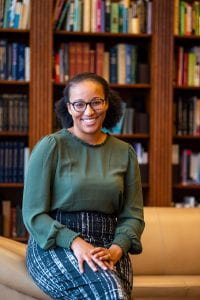Dean Stephanie Knight has named Dr. Lin Lipsmeyer, Department Chair of SMU Simmons Teaching and Learning Department, as Simmons’ Liaison in the Texoma Semiconductor Tech Hub (TSTH) announced by President Joe Biden in October. SMU was the only site in Texas selected and will serve as the lead agency in the economic development initiative to strengthen, build and drive innovation in the existing semiconductor supply chain in North Texas and Oklahoma.
Dr. Lipsmeyer says she has always been interested in interdisciplinary and collaborative work built on partnerships and is honored and excited about her appointment and the work ahead. “The TSTH provides such partnership opportunities to strengthen future learning and workforce. Serving as the liaison between Simmons and the TSTH consortium, I hope to use my research, interest, and experience to help Simmons, SMU, and the Tech Hub members to build innovative workforce pathways and open up learning and workforce opportunities for all.”
The consortium has started planning its Phase 2 proposals and will have its first workshop for the TSTH members on December 13 to build the model to promote enhanced collaboration, expand the region’s technical workforce and catalyze the commercialization of technological advancements through the development of three main areas.
Simmons School of Education and Human Development hopes to be involved in the overall vision and involved especially in the area of Workforce Development to promote opportunities at multiple skill levels for students and adult learners to enter the workforce, acquire new knowledge and obtain advanced degrees and certifications while minimizing the time it takes to do so. Outreach education will begin at the K-12 level while adult learners can also find a pathway to advance their careers in the semiconductor industry.
Dr. Tony Cuevas- Simmons Assistant Dean for Technology and Innovation, Dr. Richard Duschl -Caruth Institute and T&L affiliate faculty, and Dr. Corey Brady- Director of the Technology Enhanced Immersive Learning (TEIL) Cluster will also represent Simmons at the December 13 Tech Hub meeting. Dean Knight says, “I am confident these outstanding educators led by Dr. Lin Lipsmeyer will contribute their extensive expertise in research, technology, and teaching to benefit the important work of the Tech Hub. This is an incredible opportunity for SMU and Simmons as part of the consortium to have a major impact on our country and the world.” For details of the Texoma Semiconductor Tech Hub visit https://www.smu.edu/News/Research/SMU-to-lead-Texoma-Tech-Hub-to-unify-semiconductor-supply-chain



